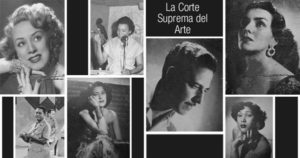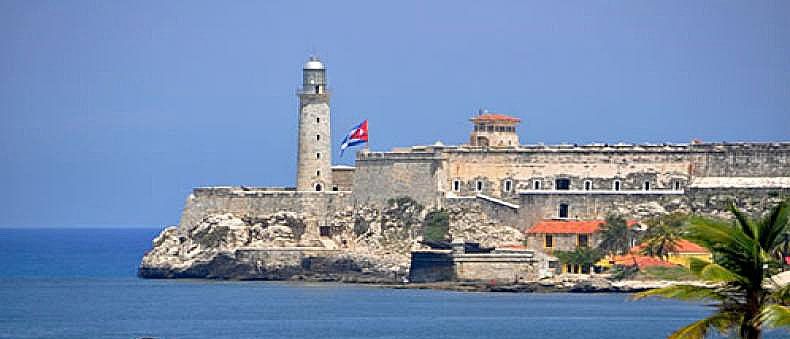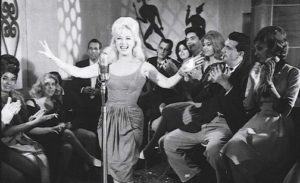ROSITA FORNÉS, CANTANTE, CONOCIDA COMO “LA PRIMERA VEDETTE DE LAS AMÉRICAS”. VIDEOS
Nacida con el nombre de Rosalía Lourdes Elisa Palet Bonavia, mejor conocido por su nombre artístico de Rosita Fornés nació en Nueva York, EE. UU., El 11 de febrero de 1923. Fue llevada a Cuba por sus padres nacidos en Cataluña cuando tenía 2 años. Fornes ganó la aclamación de la crítica como cantante. después de ganar el mejor premio en un concurso de talentos cubanos ampliamente conocido en 1938 (La Corte Suprema del Arte).
Era, en su juventud y hasta los sesenta años, considerada como un símbolo sexual, como la diosa rubia indiscutible del espectáculo cubano, aunque sus verdaderas armas en este campo han sido su presencia escénica fascinante, su profesionalismo inquebrantable y una bella melodía. Voz cantante (su repertorio teatral ha incluido numerosas operetas de larga duración y arias de ópera).
En sus veintes, ya famosa en Cuba, viajó a México donde se convirtió en una sensación nocturna y duradera. Hasta el día de hoy, Rosita Fornes es recibida en México como La Primera Vedette de América (The First Show-Woman of the Americas).
https://youtu.be/ay4U1Ku-wjY
En los años cuarenta y cincuenta, realizó una extensa gira por América Latina, los Estados Unidos y Europa. En la última parte de la década de 1950, se convirtió en la diva teatral más popular de España, rivalizando con estrellas españolas como Celia Gamez y la joven Sarita Montiel.
En Cuba, sus actuaciones de teatro con entradas agotadas e innumerables apariciones en televisión han convertido a la Sra. Fornes en la mejor superestrella femenina de este país. Rosita Fornes ha recibido numerosos premios artísticos en Cuba y en el extranjero.
Su biógrafo Pedro Baez considera a Rosita como “una mujer cálida, ingeniosa, cariñosa y muy refinada que, en el pico de la crisis del SIDA en Cuba (cuando los enfermos de SIDA estaban aislados por la fuerza en una institución de salud estatal), visitaba a los enfermos y actuaba por ellos libremente. En varias ocasiones, ha considerado su carrera cinematográfica como un “accidente” y ha declarado en términos inequívocos que deplora su filmografía anterior, que considera demasiado defectuosa y comercial.
El nombre de Rosita Fornes está asociado en todo el mundo hispano con otros grandes nombres latinos de la época: Jorge Negrete, Emilio Tuero, Libertad Lamarque, Antonio Aguilar, María Victoria, Dolores del Río, María Félix, Agustín Lara, Ernesto Lecuona, Adolfo Guzmán, Mario Moreno (Cantinflas), con quien, confesó en 1996, tuvo una larga y apasionada historia de amor.
Ya no es explotada como un símbolo sexual, Rosita Fornes permanece hoy (noviembre de 1997), una presencia activa, dominante y venerada en la escena teatral cubana. Todavía recibe la mejor facturación y todavía canta al cierre de cada importante programa de variedades que tiene lugar en la isla (a nadie se le ocurriría abandonar el teatro hasta que canta La Fornes). Siempre considerado como el ultra plus del glamour en los círculos artísticos de Cuba, no es raro (hasta el día de hoy) ver a la gente “¡ah!” a la vista de un vestido impresionante y Rosita Fornes graciosamente preparada, abriéndose paso entre la multitud en una fiesta o tomando el centro del escenario.
En julio de 1997, terminó una serie de conciertos en La Habana, protagonizó una comedia (Nenufares en el techo del mundo) y formó parte del jurado internacional en el Festival Internacional de Cine de Bahía, Brasil (octubre de 1997).
Ella se declara apolítica y devota católica y ha permanecido en Cuba a pesar de la Revolución de 1959.
Su primer esposo fue el actor mexicano Manuel Medel con quien tuvo a su único hijo, una hija llamada Rosa Maria Medel, también actriz. Su segundo esposo, un actor cubano muy apuesto y popular llamado Armando Bianchi, murió en 1981 en un accidente por ahogamiento después de veintiocho años de matrimonio.
Su única hija vive en Miami, la actriz Rosa María Medel; su yerno, el productor José Antonio Jiménez y varios nietos. Además de su hija y sus nietos, Fornés tiene una hermana menor en los Estados Unidos, Elisa Palet, del lado de su padre, Santiago Palet. El encuentro con Elisa está incluido en el documental ‘Dos Hermanas Hermosas’, dirigido por su yerno, José Antonio Jiménez.
Una aventura peligrosa (1939)
Romance musical (1941)
Los comandos de carne (1948)
Deseo (1948)
Mujeres del teatro (1951)
El mariachi desconocido (1953)
 ROSITA FORNES, SINGER, KNOWN AS “THE FIRST SHOW-WOMAN OF THE AMERICAS”. VIDEOS.
ROSITA FORNES, SINGER, KNOWN AS “THE FIRST SHOW-WOMAN OF THE AMERICAS”. VIDEOS.
Born Rosalía Lourdes Elisa Palet Bonavia better known for her artistic name of Rosita Fornés was born in New York, USA, on February 11, 1923. She was taken to Cuba by her Catalonian-born parents when she was 2. Fornes first won critical acclaim as a singer after winning the best prize at a widely-known Cuban talent contest in 1938 (La Corte Suprema del Arte).
She was, in her younger years and well into her sixties, regarded as a sex symbol, as the unchallenged blonde goddess of Cuban show business, although her true weapons in this field have been her spellbinding stage presence, her unbending professionalism and a beautifully melodious singing voice (her stage repertoire has included numerous full-length operettas and opera arias).
In her twenties, already famous in Cuba, she traveled to Mexico where she became an overnight and lasting sensation. To this day, Rosita Fornes is received in Mexico as La Primera Vedette de America (The First Show-Woman of the Americas).
In the forties and fifties, she toured extensively throughout Latin America, the US, and Europe. In the latter part of the 1950s, she became Spain’s most popular stage diva, rivaling Spanish stars such as Celia Gamez and the younger Sarita Montiel.
In Cuba, her sold-out theater performances and countless TV appearances have made Ms. Fornes this country’s top female superstar. Rosita Fornes has received numerous artistic awards in Cuba and abroad.
According to her biographer Pedro Baez, “she is a warm, witty, caring, and very refined woman who, at the peak of the AIDS crisis in Cuba (when AIDS sufferers were forcibly isolated into a state-run health institution), would visit the sick and perform for them freely. On several occasions, she has regarded her film career as an “accident” and has declared in no uncertain terms that she deplores her earlier filmography, which she considers too flawed and commercial”.
Rosita Fornes’ name is associated throughout the Hispanic world with other great Latin names of the period: Jorge Negrete, Emilio Tuero, Libertad Lamarque, Antonio Aguilar, Maria Victoria, Dolores del Rio, Maria Felix, Agustin Lara, Ernesto Lecuona, Adolfo Guzman, Mario Moreno (Cantinflas)-with whom, she confessed in 1996, she had a long-running and passionate love affair).
No longer exploited as a sex symbol, Rosita Fornes remains today, an active, commanding, and venerated presence in the Cuban stage scene. She still gets top billing and she still sings at the closing of every important variety show that takes place in the Island (no one would even think of leaving the theater until La Fornes sings). Always considered to be the non plus ultra of glamour in Cuba’s artistic circles, it is not uncommon to watch people admiring her at the sight of a stunningly dress and graciously poised Rosita Fornes making her way through the crowds in a party or taking center stage.
In July 1997 she finished a series of concerts in Havana, starred in a comedy play (Nenufares en el techo del mundo), and was part of the international jury at the International Film Festival in Bahia, Brazil (Oct. 1997).
She declares herself apolitical and a devout Catholic and has remained in Cuba despite the Revolution of 1959.
Her first husband was Mexican actor Manuel Medel with whom she had her only child, a daughter by the name of Rosa Maria Medel, also an actress. Her second husband, a very handsome and popular Cuban actor by the name of Armando Bianchi, died in 1981 in a drowning accident after twenty-eight years of marriage.
His only daughter lives in Miami, the actress Rosa María Medel; his son-in-law, producer José Antonio Jiménez and several grandchildren. In addition to her daughter and grandchildren, Fornés has a younger sister in the United States, Elisa Palet, on the side of her father, Santiago Palet. The meeting with Elisa is included in the documentary ‘Dos Hermanas Hermosas’, directed by her son-in-law, José Antonio Jiménez.
A Dangerous Adventure (1939)
Musical Romance (1941)
The Flesh Commands (1948)
Desire (1948)
Women of the Theatre (1951)
The Unknown Mariachi (1953)
Agencies/ IMDb/ Wiki/ RF Biography/ Pedro F. Baez/ Internet Photos/ YouTube/ Arnoldo Varona/ www.TheCubanHistory.com
THE CUBAN HISTORY, HOLLYWOOD.













